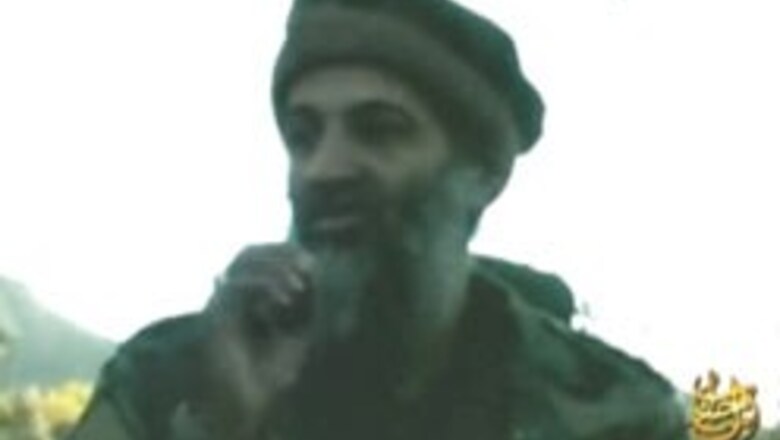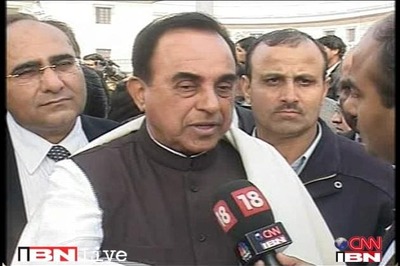
views
New Delhi: Osama bin Laden on Thursday called on Pakistanis to wage holy war on their President, saying in a new recording that it was their religious duty to overthrow General Pervez Musharraf for his alliance with the US against Islamic militants.
But Pakistan dismissed the same, taking a vow instead to cleanse its soil of extremists and terrorists like the al-Qaeda.
"If someone is hurling threats at us, that is their view. The whole nation is behind us and the Pakistan army is a national institution," Pakistan military spokesman Major General Waheed Arshad said.
''We are already committed to fighting extremists and terrorists -- there is no change in our policy,'' he added.
In his new video, Osama bin Laden vowed to retaliate against Gen Musharraf for the killing of Lal Masjid cleric Abdul Rashid Ghazi and the raid on the mosque in July. More than 100 of rebels were killed in an assault on the radical Lal Masjid in Islamabad.
The message on Thursday was the third from bin Laden this month after a long lull, coming in a flurry of al-Qaeda propaganda marking the anniversary of the September 11, 2001, terror attacks on the United States.
Joining in, bin Laden's chief deputy, Ayman al-Zawahri, issued a video on Thursday seeking to galvanize Islamic fighters from North Africa to Afghanistan.
Al-Zawahri, who is seen by some counterterrorism experts to be al-Qaeda's operational chief rather than bin Laden, said the United States is losing wars in Iraq, Afghanistan and elsewhere.
''What they claim to be the strongest power in the history of mankind is today being defeated in front of the Muslim vanguards of jihad (holy war) six years after the two raids on New York and Washington,'' he said.
The string of video and audio messages around the anniversary has shown an increased sense of triumphalism in al-Qaeda's tone at a time when US intelligence reports say its core leadership appears to have regrouped in the Afghan-Pakistani border region.
''You can actually see the increase in the number of videos tie in with recent US assessments that al-Qaeda is resurgent, that it is much stronger,'' said Michael Jacobson, a former FBI terrorism expert now at the Washington Institute for Near East Policy.
''They are feeling more stable, feeling much more secure, so it's not a surprise that they are able to put out more videos,'' he added.
Many of the messages have hammered on US struggles in Iraq to push the claim that Islamic militants are winning, and bin Laden's video against Musharraf signaled that al-Qaeda wants to turn its guns on one of the United States' most important allies in fighting the terror network.
Al-Zawahri and another top al-Qaeda figure, Abu Yahia al-Libi, called for Pakistanis to rise up against Musharraf in recent messages. But the tape from bin Laden, al-Qaeda's most symbolic and charismatic figure, adds weight to the declaration of jihad against the Pakistani leader.
'Infidel rulers'
In a 23-minute video showing previously released footage of bin Laden, the al-Qaeda leader's voice delivered a call to jihad in Arabic with English subtitles, but the message also was released in versions dubbed in Urdu and Pashtu, languages widely used in Pakistan and Afghanistan.
Bin Laden branded Musharraf an infidel because of the siege of the Red Mosque, a militant stronghold in the Pakistani capital overrun by commandos in July. The battle killed more than 100 people, including one of the militants' leaders, Abdul Rashid Ghazi.
The siege ''demonstrated Musharraf's insistence on continuing his loyalty, submissiveness and aid to America against the Muslims,'' bin Laden said. ''It is obligatory on the Muslims in Pakistan to carry out jihad and fighting to remove Pervez, his government, his army and those who help him.''
In the recording, titled ''Come to Jihad,'' bin Laden quoted fatwas, or religious edicts, from hard-line Islamic scholars on the duty of Muslims to overthrow infidel rulers.
PAGE_BREAK
Anyone ''who believes that the strength required to rebel has not yet been completed must complete it and take up arms against Pervez and his army without procrastination,'' he said.
The message comes at a delicate time for Musharraf, who has been targeted by four assassination attempts since 2002.
His popularity has plummeted in recent months as he seeks a new presidential term in an October 6 vote by Pakistani lawmakers. Under popular pressure, his aides announced that Musharraf would quit as army chief and restore civilian rule if elected to a new five-year term.
Wave of violence
The mosque siege also brought a wave of violence and suicide attacks in Pakistan blamed on Taliban and al-Qaeda militants, intensifying the discontent of religious conservatives over Musharraf's alliance with the United States.
In Islamabad, the Pakistan army spokesman, Major General Waheed Arshad, said ''such threats issued through videos or in any other way cannot deter us from fulfilling our national duty'' to ''eradicate terrorism.''
State Department spokesman Tom Casey said the message was ''not surprising'' because bin Laden's sees that Pakistan has been a strong ally to the US ''in the fight against his kind of extremism.''
Before this month, bin Laden had not issued a message in more than a year. A video released a few days before the September 11 anniversary contained the first new images of him in nearly three years.
The other video released on Thursday showed al-Qaeda's increasing media sophistication. It amounted to an 80-minute documentary interweaving al-Zawahri's speech with footage from the September 11 attacks, interviews with experts and officials taken from Western and Arab television and old footage and audiotapes of bin Laden.
Al-Zawahri is believed to play a large role in directing al-Qaeda's strategy on the ground, and in his frequent videos the Egyptian militant often lays down the network's doctrinal line.
In the new video, he seemed to be playing both roles, speaking in front of shelves lined with Islamic books, an automatic rifle leaning against the shelves.
Holy war
Al-Zawahri railed against Islamic clerics who don't advocate holy war and spoke about progress in numerous fronts of jihad, including Afghanistan, Iraq, Somalia, Chechnya and North Africa.
He called for jihad in North Africa to ''cleanse (it) of the children of France and Spain.'' And he urged more fighting in Sudan to drive out a planned UN-African Union peacekeeping force in the Darfur region, where Arab militiamen have been accused of committing atrocities against ethnic African communities.
The video showed scenes of al-Qaeda's leader in Afghanistan, Mustafa Abu al-Yazeed, meeting with a senior Taliban commander. In contrast to past videos that showed al-Qaeda and Taliban fighters in desert terrain, Abu al-Yazeed and the commander sat in a verdant field surrounded by trees as a jihad anthem played, extolling the virgins that will meet martyrs in paradise.
On the video, Abu al-Yazeed said al-Qaeda's ties with the Taliban were strengthening. The Taliban commander, Dadullah Mansoor, vowed to ''target the infidels in Afghanistan and outside Afghanistan'' and to ''focus our attacks, Allah willing, on the coalition forces in Afghanistan.''
(With agency inputs)


















Comments
0 comment